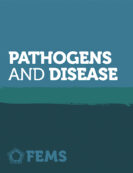FEMS Microbiology Ecology Poster Prize: Lýdie Jakubová
We send our congratulations to Lýdie Jakubová, who won the Best Poster Award at the 4th Conference on Ecology of Soil Microorganisms, sponsored by our journal FEMS Microbiology Ecology. Her poster was titled “Lignin-utilizing consortia for reducing the concentrations of aromatic pollutants”.
 The 4th Ecology of Soil Microorganisms meeting occurred on 19 – 23 June 2022 in Prague, Czech Republic. The theme was “Microbes as Important Drivers of Soil Processes”. There is a Thematic Issue connected to this meeting which will focus on the role of soil microorganisms in ecosystem processes such as decomposition, biogeochemistry and nutrient cycling, microbiomes of natural and managed soils and interactions of microorganisms with plants and other macro-organisms. More information about the Ecology of Soil Microorganisms Thematic Issue here.
The 4th Ecology of Soil Microorganisms meeting occurred on 19 – 23 June 2022 in Prague, Czech Republic. The theme was “Microbes as Important Drivers of Soil Processes”. There is a Thematic Issue connected to this meeting which will focus on the role of soil microorganisms in ecosystem processes such as decomposition, biogeochemistry and nutrient cycling, microbiomes of natural and managed soils and interactions of microorganisms with plants and other macro-organisms. More information about the Ecology of Soil Microorganisms Thematic Issue here.
What is your current position, and what was your scientific journey to get there?
I recently started my doctoral studies at the University of Chemistry and Technology in Prague. I have been visiting this institution for quite some time. I obtained my bachelor’s degree in Forensic Analysis here, but I was not very interested in research in analytics. I decided to change my field of study and applied for a master’s program in Microbiology and Genetic Engineering. I became fascinated by this invisible world where evolution created uncountable strategies of living and I love to think about all the ways we can use microorganisms to our benefit. I ended up in the Laboratory of Microbial Ecology under professor Uhlík’s guide, where I study the role of lignin and its monomers in the ecology of soil microorganisms.”
Could you describe the research your poster covered?
We focus on lignin as a carbon source because of its aromatic structure and the diversity of structures formed during its depolymerization. We presumed, that bacteria able to utilize such complex molecule contains broad specificity enzymes that could also interact with some pollutants, containing similar structural motifs. My poster summarized the results of a resting cell degradation assay that was performed on soil bacterial consortia enriched with lignin or its degradation intermediates. We collected the cells and put them in mineral media with pollutants such as naphthalene, dibutyl phthalate, diphenyl ether, etc., and measured the depletion of those pollutants after 48 h incubation.”
What do you hope to focus your research on in the future?
I am interested in the mutual effects of plants and microorganisms and their cooperation in the degradation of xenobiotics. In my future work, I would like to investigate more the impact of particular plant metabolites on microbial biomass. Additionally, I would like to apply methods of molecular biology and explore the genes responsible for bioremediation.”
–
We use income from the FEMS Journals to fund grants, awards, and projects, and to support our knowledge sharing events and initiatives. Consider publishing your research with our journals to help the global microbiology community.
All but one of the FEMS journals are now fully open access (OA), with one journal, FEMS Microbiology Letters remaining a subscription journal with free-to-publish and OA options. Open access is key to supporting the FEMS mission of disseminating high quality research as widely as possible: when high quality, peer reviewed sound science is open access, anyone, anywhere in the world with an internet connection, can read it.







